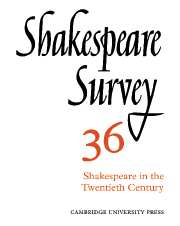Book contents
- Frontmatter
- Shakespeare and the Living Dramatist
- Blood and Wine: Tragic Ritual from Aeschylus to Soyinka
- Hamlet Andante/Hamlet Allegro: Tom Stoppard’s Two Versions
- Auden, Shakespeare, and the Defence of Poetry
- Graves on Lovers, and Shakespeare at a Lovers’ Funeral
- Tragic Balance in Hamlet
- Hamlet Across Space and Time
- Shakespeare’s Scripts and the Modern Director
- ‘He Shall Live a Man Forbid’: Ingmar Bergman’s Macbeth
- Komisarjevsky at Stratford-upon-Avon
- Troilus and Cressida and the Definition of Beauty
- The Pastoral Reckoning in Cymbeline
- New Created Creatures: Ralph Crane and the Stage Directions in The Tempest
- Arden of Faversham
- ‘Pickleherring’ and English Actors in Germany
- Shakespeare Performances in Stratford-upon-Avon and London, 1981–2
- The Year's Contributions to Shakespearian Study 1 Critical Studies
- 2 Shakespeare’s Life, Times and Stage
- 3 Textual Studies
- Index
- Plate Section
Graves on Lovers, and Shakespeare at a Lovers’ Funeral
Published online by Cambridge University Press: 28 March 2007
- Frontmatter
- Shakespeare and the Living Dramatist
- Blood and Wine: Tragic Ritual from Aeschylus to Soyinka
- Hamlet Andante/Hamlet Allegro: Tom Stoppard’s Two Versions
- Auden, Shakespeare, and the Defence of Poetry
- Graves on Lovers, and Shakespeare at a Lovers’ Funeral
- Tragic Balance in Hamlet
- Hamlet Across Space and Time
- Shakespeare’s Scripts and the Modern Director
- ‘He Shall Live a Man Forbid’: Ingmar Bergman’s Macbeth
- Komisarjevsky at Stratford-upon-Avon
- Troilus and Cressida and the Definition of Beauty
- The Pastoral Reckoning in Cymbeline
- New Created Creatures: Ralph Crane and the Stage Directions in The Tempest
- Arden of Faversham
- ‘Pickleherring’ and English Actors in Germany
- Shakespeare Performances in Stratford-upon-Avon and London, 1981–2
- The Year's Contributions to Shakespearian Study 1 Critical Studies
- 2 Shakespeare’s Life, Times and Stage
- 3 Textual Studies
- Index
- Plate Section
Summary
In the Foreword to his Collected Poems 1965, Robert Graves wrote that his ‘main theme was always the practical impossibility, transcended only by a belief in miracle, of absolute love continuing between man and woman’.
Certainly a large proportion of Grave’s poetry is about love; and the range of experience is wide. At one end are humorous or disgusted encounters with sex, and at the other triumphant claims that the miracle he allows for has come about, in the love between himself and embodiments of his Muse or Goddess.
Somewhere in the realistic or even disillusioned area is the popular anthology selection 'The Thieves'. It is short enough to be quoted in its entirety:
Lovers in the act dispense
With such meum-tuum sense
As might warningly reveal
What they must not pick or steal,
And their nostrum is to say:
' I and you are both away.'
After, when they disentwine
You from me and yours from mine,
Neither can be certain who
Was that I whose mine was you.
To the act again they go
More completely not to know.
Theft is theft and raid is raid
Though reciprocally made.
Lovers, the conclusion is
Doubled sighs and jealousies
In a single heart that grieves
For lost honour among thieves.
- Type
- Chapter
- Information
- Shakespeare Survey , pp. 39 - 42Publisher: Cambridge University PressPrint publication year: 1983

